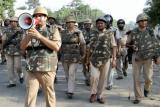Mumbai, Mar 29: Virologist Minal Dakhave Bhosale led from the front to create India's first coronavirus testing kit even when she was in the last stage of her pregnancy.
Bhosale's efforts paid the price with her team delivering the testing kit in a record time of six weeks.
Bhosale gave birth to a baby girl just a day before submitting the kit to the authorities for evaluation.
"It was like giving birth to two babies," Bhosale told PTI over the phone.
The virologist said both the journeys - that happened in parallel - were not without challenges.
"There were complications in the pregnancy while work on the test kit was on. The baby was delivered through cesarean," she said.
Bhosale said she felt that it was the right time to serve the people to help them in combating the coronavirus threat.
"I had been working for five years in this field and if I don't work in emergency situations when my services are needed the most, then what is the use?" she said.
Though Bhosale was not able to visit the office due to the pregnancy, she was guiding a team of 10 persons working on the project at Mylab Discovery in Pune.
The strong bonds forged with the team over the years and their support made it possible, she said.
Company's co-founder Shrikant Patole said just like drug discovery, test kits too go through a lot of quality checks to improve the precision.
He credited Bhosale for the success of the project.
The COVID-19 testing kit delivered by Bhosale's team will reduce the time taken for delivering a result to 2.5 hours from the prevalent practice of eight hours.
A pioneering approach to testing without compromising on the results was adopted, Bhosale said.
The Maylab test kit will cost Rs1,200, a quarter of Rs 4,500 per kit that the government has been spending on testing so far.
"I'm happy that I could do something for the country," Bhosale said.
As of Friday, only 27,000 of the 1.3 billion people were tested for the virus in the country.
According to experts, high scale testing is essential because it alone can ensure an early diagnosis of COVID-19 and lower down the fatalities.
The company is confident of ramping up the capacity at its plant in Lonavala to deliver 100,000 kits a week, Patole said.
He said the authorities are helping the company, including giving priority for shipping of the raw materials.






Comments
Add new comment